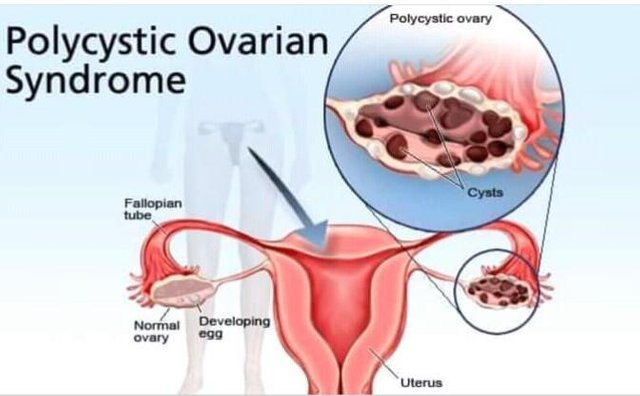PCOS, one of the leading causes of Infertility
in female
Polycystic ovary syndrome (PCOS) is a
hormonal disorder common among women
of reproductive age. Women with PCOS may
have infrequent or prolonged menstrual
periods or excess male hormone (androgen)
levels. The ovaries may develop numerous
small collections of fluid (follicles) and fail
to regularly release eggs.
The exact cause of PCOS is unknown. Early
diagnosis and treatment along with weight
loss may reduce the risk of long-term
complications such as type 2 diabetes and
heart disease.
Symptoms
Signs and symptoms of PCOS often develop
around the time of the first menstrual period
during puberty. Sometimes PCOS develops
later, for example, in response to substantial
weight gain.
Signs and symptoms of PCOS vary. A
diagnosis of PCOS is made when you
experience at least two of these signs:
Irregular periods. Infrequent, irregular or
prolonged menstrual cycles are the most
common sign of PCOS. For example, you
might have fewer than nine periods a year,
more than 35 days between periods and
abnormally heavy periods.Excess androgen. Elevated levels of male
hormone may result in physical signs, such
as excess facial and body hair (hirsutism),
and occasionally severe acne and male-
pattern baldness.Polycystic ovaries. Your ovaries might be
enlarged and contain follicles that surround
the eggs. As a result, the ovaries might fail
to function regularly.
When to see a doctor
See your doctor if you have concerns about
your menstrual periods, if you're
experiencing infertility or if you have signs
of excess androgen such as worsening
hirsutism, acne and male-pattern baldness.
Causes
The exact cause of PCOS isn't known.
Factors that might play a role include:
Excess insulin. Insulin is the hormone
produced in the pancreas that allows cells
to use sugar, your body's primary energy
supply. If your cells become resistant to the
action of insulin, then your blood sugar
levels can rise and your body might produce
more insulin. Excess insulin might increase
androgen production, causing difficulty with
ovulation.Low-grade inflammation. This term is
used to describe white blood cells'
production of substances to fight infection.
Research has shown that women with PCOS
have a type of low-grade inflammation that
stimulates polycystic ovaries to produce
androgens, which can lead to heart and
blood vessel problems.Heredity. Research suggests that certain
genes might be linked to PCOS.Excess androgen. The ovaries produce
abnormally high levels of androgen,
resulting in hirsutism and acne.
Obesity is associated with PCOS and can
worsen complications of the disorder.

Any references please?
Downvoting a post can decrease pending rewards and make it less visible. Common reasons:
Submit